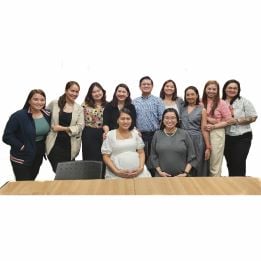

| Avida Land Corp.



Avida Land Corp.
| Avida Land Corp.
Team size: 11
Key Team members: Ricardo Victor K. Ramos, Marianne C. Sibulo-Arce, Juvy Lyn A. Dimaano, Zyra Frances P. Aquilizan
What are the most significant cases or transactions that your legal team has recently been involved in?
The significant case, transaction and challenge in the mid-market real estate is meeting the demands and needs of an economies of scale business, improving adaptability and efficiencies, and managing cost. For a knowledge and experiential-based division, the Legal Team continues to be responsive to all groups and departments of Avida Land and its subsidiaries and controlled entities; collaborate with the other residential business units of Ayala Land; and contribute in the overall goodwill and value proposition of Ayala Land and the Ayala Group.
Goodwill over 34 Years. With a track record over three decades, Avida Land is present in 27 locations with 106 ongoing projects. The day-to-day operations of the Legal Team in servicing all the groups and departments over these 106 ongoing projects is significant, especially considering that all non-litigation work are all done in-house, including compliance over privacy and its money laundering and terrorism financing prevention program, land and corporate due diligence, customer due diligence, intellectual property registrations, and mergers and acquisitions, among others. This thrust keeps the team fully engaged, with numerous learning and experiential opportunities, while keeping headcount, cost and budget lean.
How do you motivate and manage your legal team well?
As a knowledge and experiential-based group, the team is motivated through learning opportunities through formal training and certifications, as well as through delegation of new and novel assignments. In fact, it is through our “learning by doing” attitude that we are able minimise and manage Avida’s external cost.
The individual team members are empowered to directly handle their matters with autonomy to make their own decisions and recommendations. They are encouraged to have an interdisciplinary and holistic approach, to bridge the communication gap between horizontal and vertical silos, and to think out of the box and propose new and creative solutions. They are reminded to not only be responsive to the issue but to transcend the legal complexion of the matter and extract as much commercial, relational and operational value and opportunity as possible.
While we recognise that there is no monopoly of knowledge and experience, we create a safe space for discourse and collaboration among lawyers and non-lawyers, regardless of rank or seniority. Everyone is free to and can contribute. But we understand that the decision lies with the lead and, ultimately, me.
Most importantly, we emphasise health and rest. Team members participate in individual and team sports activities. They are encouraged to use vacation days and, when so exercised, all our calendars note the same. They are encouraged to undergo executive check-ups and take sick days which are respected.
How do you see the role of in-house legal teams evolving in the Philippines over the next five-ten years?
As technology rapidly advances, the legal field must also evolve. In recent years, in-house counsels have encountered legal issues that are relatively new. With the public gaining easier access to various types of artificial intelligence, the growing use of social media, and the increasing importance of data management and analytics in business and operations, the role of in-house legal teams has become crucial in ensuring compliance with data privacy and securing intellectual properties, among others. Consequently, in-house counsels must broaden their knowledge to adapt and keep pace with these emerging fields of law. In-house legal teams will need to place greater emphasis on compliance and risk management, ensuring not only adherence to current regulations, but also anticipating and preparing for new regulatory developments.